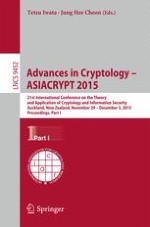2015 | OriginalPaper | Buchkapitel
Card-Based Cryptographic Protocols Using a Minimal Number of Cards
verfasst von : Alexander Koch, Stefan Walzer, Kevin Härtel
Erschienen in: Advances in Cryptology -- ASIACRYPT 2015
Verlag: Springer Berlin Heidelberg
Aktivieren Sie unsere intelligente Suche, um passende Fachinhalte oder Patente zu finden.
Wählen Sie Textabschnitte aus um mit Künstlicher Intelligenz passenden Patente zu finden. powered by
Markieren Sie Textabschnitte, um KI-gestützt weitere passende Inhalte zu finden. powered by
